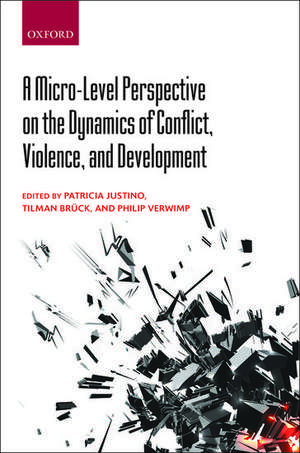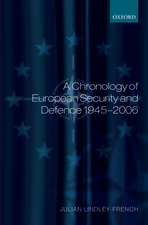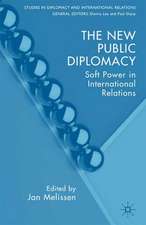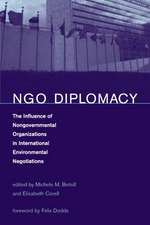A Micro-Level Perspective on the Dynamics of Conflict, Violence, and Development
Editat de Patricia Justino, Tilman Brück, Philip Verwimpen Limba Engleză Hardback – 12 dec 2013
Preț: 718.32 lei
Preț vechi: 1029.88 lei
-30% Nou
Puncte Express: 1077
Preț estimativ în valută:
137.45€ • 143.87$ • 114.40£
137.45€ • 143.87$ • 114.40£
Carte tipărită la comandă
Livrare economică 19-25 martie
Preluare comenzi: 021 569.72.76
Specificații
ISBN-13: 9780199664597
ISBN-10: 0199664595
Pagini: 342
Ilustrații: 17 Figures, 19 Tables
Dimensiuni: 162 x 237 x 29 mm
Greutate: 0.69 kg
Editura: OUP OXFORD
Colecția OUP Oxford
Locul publicării:Oxford, United Kingdom
ISBN-10: 0199664595
Pagini: 342
Ilustrații: 17 Figures, 19 Tables
Dimensiuni: 162 x 237 x 29 mm
Greutate: 0.69 kg
Editura: OUP OXFORD
Colecția OUP Oxford
Locul publicării:Oxford, United Kingdom
Recenzii
this is an engaging volume that tackles the issue of violent conflict in a way that should inspire not just future researchers, but also development agencies and governments across the world.
Notă biografică
Patricia Justino is a development economist specialising in applied microeconomics. Her research work focuses on the impact of violence and conflict on household welfare and local institutional structures, the micro-foundations of violent conflict, and the implications of violence for economic development. Dr Justino has led several research projects funded by the British Academy, DFID, the European Commission, the ESRC, FAO, the Leverhulme Trust, UNDP, UNESCO, UN Women, and the World Bank. She is the Director of MICROCON and co-founder and co-director of the Households in Conflict Network. Since June 2010, she has convened the Conflict, Violence and Development cluster, part of the Vulnerability and Poverty Reduction Team, at the Institute of Development Studies.Tilman Brück is the Director of the Stockholm International Peace Research Institute, and a Professor at Humboldt-University of Berlin. Previously he was Head of the Department of Development and Security at the German Institute for Economic Research. He studied economics at Glasgow University and Oxford University and obtained his doctorate in economics from Oxford University. His research interests focus on the economics of household behaviour and well-being in conflict and post-conflict economies and the economics of terrorism and insecurity. Professor Brück is a co-founder and co-director of the Households in Conflict Network, the coordinator of the Economics of Security Initiative, and the coordinator or deputy coordinator of several European research projects in the 6th and 7th framework programmes. He has also worked as a consultant for BMZ, DFID, the European Commission, GIZ, ILO, KfW, OECD, UNDP, USAID, and the World Bank. Philip Verwimp obtained his PhD in Economics from the Catholic University of Leuven in January 2003 with a dissertation on the political economy of development and genocide in Rwanda. He specialises in the economic causes and consequences of conflict at the micro-level. He has done quantitative work on the death toll of the genocide and on the demography of post-genocide Rwanda. He works on poverty and health in conflict-affected countries. Dr Verwimp was a Fulbright-Hays Fellow at Yale University and worked for the World Bank as a Poverty Economist. He received the Jacques Rozenberg Award from the Auschwitz Foundation for his dissertation. He taught Development Economics at the Institute of Social Studies in The Hague and at the Universities of Antwerp, Leuven, and Utrecht. He was a research fellow from the Fund for Scientific Research (Flanders, Belgium) and visiting fellow at ECARES (2007-2009).










